
Digital Humanities Quarterly
Scope & Guideline
Empowering voices in the realm of digital scholarship.
Introduction
Aims and Scopes
- Interdisciplinary Research:
Fostering collaboration across various fields such as history, literature, art, and computer science, DHQ promotes research that utilizes digital tools to reinterpret traditional humanities scholarship. - Computational Methods:
The journal emphasizes the application of computational techniques, including machine learning, data visualization, and digital mapping, to analyze and present humanities data in new and insightful ways. - Cultural Preservation and Access:
A core aim of DHQ is to enhance access to cultural heritage through digital archives and resources, ensuring that historical materials are preserved and made available to a broader audience. - Critical Engagement with Technology:
DHQ encourages a critical examination of the implications of digital tools and methodologies in the humanities, fostering discussions on ethics, accessibility, and the impact of technology on scholarly practices. - Innovative Pedagogies:
The journal explores new educational methodologies in the digital humanities, promoting the integration of digital tools into humanities curricula and fostering skills development among students and scholars.
Trending and Emerging
- Artificial Intelligence and Machine Learning:
There has been a marked increase in papers discussing the application of AI and machine learning in the analysis of historical texts and visual data, addressing ethical considerations and enhancing research capabilities. - Digital Archives and Accessibility:
Emerging themes focus on improving access to digital archives, utilizing technologies such as crowdsourcing and collaborative frameworks to engage diverse communities in the preservation and interpretation of cultural heritage. - Environmental Humanities:
A growing number of publications are examining the intersection of digital humanities and environmental studies, reflecting a heightened awareness of ecological issues and the role of digital tools in analyzing environmental data. - Data Feminism and Social Justice:
Recent trends show an increased focus on data feminism and the role of digital humanities in promoting social justice, particularly in relation to marginalized voices and communities, indicating a shift towards more inclusive research methodologies. - Visualization Techniques:
The use of advanced data visualization techniques has become more prominent, with researchers increasingly exploring how visual representations can enhance understanding and interpretation of complex datasets in the humanities.
Declining or Waning
- Traditional Textual Analysis:
While textual analysis remains relevant, there has been a noticeable shift away from purely traditional methods towards more computational approaches, such as machine learning and data mining, which offer deeper insights into large datasets. - Narrowly Defined Historical Studies:
Papers centered on very specific historical events or figures without the integration of digital methodologies have become less frequent, as the field leans towards broader, more interdisciplinary inquiries that encompass various perspectives. - Static Archives:
The focus on static digital archives has waned in favor of dynamic, interactive platforms that allow for ongoing engagement and collaboration, reflecting a broader trend towards participatory and community-driven projects.
Similar Journals
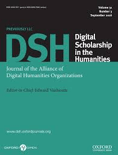
Digital Scholarship in the Humanities
Fostering Interdisciplinary Connections through Digital Scholarship.Digital Scholarship in the Humanities is a premier journal published by Oxford University Press, dedicated to advancing research at the intersection of digital technology and the humanities. With an ISSN of 2055-7671 and an E-ISSN of 2055-768X, this journal serves as a vital platform for scholars exploring the vast potentials of digital methodologies in humanities disciplines, particularly in linguistics and language studies. Recognized within the Q1 quartile for linguistics and language categories, it stands out with notable Scopus rankings, including top positions within the 80th percentile for Arts and Humanities. The journal emphasizes open access to promote broader dissemination of knowledge, making it accessible to a diverse audience of researchers, students, and professionals. Spanning from 2015 to 2024, Digital Scholarship in the Humanities aims to foster interdisciplinary collaboration and innovation, reflecting the growing importance of digital tools in redefining scholarship.
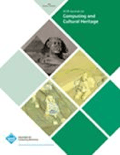
ACM Journal on Computing and Cultural Heritage
Fostering Interdisciplinary Connections in Cultural Heritage.ACM Journal on Computing and Cultural Heritage is a leading scholarly journal published by the Association for Computing Machinery, focusing on the intersection of technology, computing, and the preservation of cultural heritage. Established in 2008, the journal has consistently provided a platform for innovative research that bridges the gap between computational techniques and cultural conservation strategies. With a robust impact factor reflecting its academic rigor and relevance—ranked Q2 in both Computer Graphics and Computer-Aided Design and Computer Science Applications, and Q1 in Conservation—this journal stands out in its ability to foster interdisciplinary collaborations. Notably, it ranks in the top 5% of the Arts and Humanities within its field, highlighting its pivotal role in advancing knowledge and practice in conservation through technology. The journal is vital for researchers, professionals, and students keen on exploring how computing innovations can enhance the safeguarding and interpretation of cultural heritage. Although access options are not distinctly categorized, contributors and readers are invited to engage with the cutting-edge research published through various methods that support scholarly discourse.
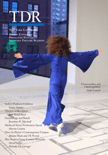
TDR-The Drama Review-The Journal of Performance Studies
Unveiling the Dynamics of Performance StudiesTDR-The Drama Review-The Journal of Performance Studies, published by Cambridge University Press, is a premier academic journal dedicated to the exploration of performance studies through a multidisciplinary lens. With an impressive Q1 ranking in both Literature and Literary Theory and Visual Arts and Performing Arts, TDR is recognized for its significant impact in advancing theoretical frameworks and critical discourses within these fields. The journal proudly encompasses a wide range of topics, from contemporary performance to historical analysis, making it a vital resource for researchers, practitioners, and students alike. As a platform for innovative scholarship, it encourages the exchange of ideas and methodologies that shape our understanding of performance in cultural contexts. Although it does not offer open access options, the contributions published in TDR are instrumental in fostering a deeper understanding of the arts and humanities, positioning it at the forefront of academic inquiry.
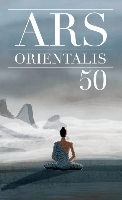
ARS Orientalis
Bridging Tradition and Modernity in ScholarshipARS Orientalis is a distinguished academic journal published by the Smithsonian Institution's Freer Gallery of Art, specializing in the fields of archaeology, cultural studies, and the visual and performing arts. With an ISSN of 0571-1371, this journal contributes significantly to scholarly discourse, having established a robust timeline of publication since its inception, notably from 2001 to 2006, 2010 to 2012, 2014 to 2017, and resuming again from 2022 to 2023. Though currently not open access, it maintains a respectable standing in the academic community with a categorization into Q3 quartiles across several disciplines, highlighting its relevance amid rigorous scholarly evaluation. The journal is particularly valuable for researchers, professionals, and students who seek to explore interdisciplinary connections within its scope. Situated in the United States, it aims to disseminate insightful research that bridges the gap between traditional scholarship and contemporary studies in visual culture and archaeological findings.

Miranda
Empowering voices in social science scholarship.Miranda (ISSN: 2108-6559, E-ISSN: 2108-6559) is a distinguished open access journal published by UNIV TOULOUSE II-JEAN JAURES, dedicated to advancing knowledge across various fields of the humanities and social sciences. Since its establishment in 2010 as an open access platform, Miranda has aimed to foster inclusive academic discourse by providing unrestricted access to high-quality research. With its commitment to accessibility and scholarly excellence, this journal serves as an essential resource for researchers, professionals, and students seeking to enrich their understanding and engage with contemporary issues within their disciplines. The journal prides itself on its rigorous peer-review process and aims to publish original research, reviews, and interdisciplinary studies that contribute to the evolving landscape of humanities and social science research. Located in Toulouse, France, Miranda is poised to make a significant impact in its field and invites contributions that reflect diverse perspectives and innovative research methodologies.

Humanities & Social Sciences Communications
Bridging theory and practice in contemporary societal challenges.Humanities & Social Sciences Communications is a premier journal published by SPRINGERNATURE, based in the vibrant academic environment of the United Kingdom. Launched as an Open Access publication in 2020, it provides a dynamic platform for interdisciplinary research across the fields of arts and humanities, business, management, economics, psychology, and social sciences. With a distinguished impact factor reflected in its 2023 categorization as Q1 across multiple subjects, this journal exemplifies excellence, holding high rankings in Scopus for general art, economics, and social sciences categories, placing it in the top tiers of research outputs worldwide. The journal aims to foster scholarly dialogue, encourage innovative ideas, and advance significant findings that address the complexities of contemporary societal issues. With open access options, it ensures that research is widely disseminated, promoting global collaboration and engagement among researchers, professionals, and students alike. By merging analytical rigor with real-world relevance, Humanities & Social Sciences Communications stands as a cornerstone resource for anyone seeking to make an impact in their respective fields.
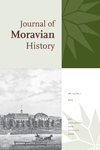
Journal of Moravian History
Exploring the Rich Tapestry of Moravian HeritageWelcome to the Journal of Moravian History, a prominent academic periodical published by Penn State University Press. With a focus on the intricate tapestry of Moravian history and its religious dimensions, this journal caters to scholars, historians, and students who seek to deepen their understanding of this unique cultural heritage. Having converged from 2014 to 2023, the journal has established itself within the Q4 category in both History and Religious Studies, as recognized in the 2023 assessments, and it ranks respectively in the 60th percentile for Religious Studies and 58th percentile for History in Scopus evaluations. While the journal is not open access, it provides valuable insights and rigorous research that enriches the academic dialogue surrounding Moravian studies. With a commitment to advancing scholarship and fostering a greater appreciation for this influential community, the Journal of Moravian History remains an essential resource for those passionate about historical and religious analysis.

Manuscript Studies-A Journal of the Schoenberg Institute for Manuscript Studies
Connecting Scholars through Manuscript InsightsManuscript Studies: A Journal of the Schoenberg Institute for Manuscript Studies, published by University of Pennsylvania Press, serves as a pivotal resource in the intertwined fields of conservation, library sciences, and literature. With an ISSN of 2381-5329 and an E-ISSN of 2380-1190, the journal has been actively contributing to academic discourse since its inception in 2016 and continues to resonate through 2024. The journal is categorized in the Q3 quartiles for Conservation and Library and Information Sciences, and Q2 for Literature and Literary Theory, reflecting its relevance and credibility within these disciplines. While it is not an open-access journal, its vital scholarship is crucial for researchers and professionals dedicated to the preservation and interpretation of manuscripts. Positioned within the competitive arenas of Scopus rankings, Manuscript Studies highlights significant contributions to the understanding of manuscript collections, offering interdisciplinary perspectives that are essential for students and scholars alike. Whether delving into the complexities of textual transmission or exploring methodologies in manuscript conservation, Manuscript Studies remains an invaluable platform for advancing knowledge and fostering dialogue in the study of manuscripts.

Antares-Letras e Humanidades
Cultivating Understanding in Literature and HumanitiesAntares-Letras e Humanidades is a prominent academic journal published by the Graduate Program in Literature, Culture & Regions at the Universidade de Caxias do Sul, Brazil. As a dynamic platform for scholarly dialogue in the humanities, this journal serves as a vital conduit for research focused on literature and cultural studies, aiming to foster a deeper understanding of these intricate fields. With its ISSN 1984-4921, Antares-Letras e Humanidades welcomes multidisciplinary approaches and encourages submissions that explore the nuances of literary expression, cultural contexts, and regional significance. While it currently operates under a non-open access model, the journal remains committed to enhancing its visibility and reach within the global academic community. As an emerging publication, it holds great potential for contributing significantly to ongoing discussions and advancements in humanities research, making it an essential resource for scholars, students, and professionals eager to engage with contemporary issues in literature and culture.

Bosniaca-Journal of the National and University Library of Bosnia and Herzegovina
Bridging Knowledge Gaps in Bosnian AcademiaBosniaca - Journal of the National and University Library of Bosnia and Herzegovina, published by the National and University Library of Bosnia and Herzegovina, is an esteemed open-access journal that has been disseminating knowledge since 2016. With an ISSN of 1512-5033 and E-ISSN of 2303-8888, this journal aims to serve as a vital resource for scholars, researchers, and practitioners in the fields of cultural studies, education, and social sciences. Despite its challenging rankings, it provides a platform for addressing and discussing the evolving landscape of Bosnian heritage, library science, and education. By prioritizing open access, Bosniaca ensures that its content is freely available to the global community, fostering collaboration and innovation in research. As it converges new insights in its 2022-2023 issues, the journal continues to play a crucial role in promoting scholarly discourse within and beyond Bosnia and Herzegovina.